
- August 2018
- Volume 12
- Issue 6
Obesity, Cancer, and the Underserved
Overweight survivors in rural and minority populations need nurses on their side.
Photo Credit: Harmony Lynn Goodson
Karen Meneses, PhD, RN, FAAN
Karen Meneses, PhD, RN, FAAN, professor and associate dean for research at the University of Alabama at Birmingham (UAB) School of Nursing, studies the intersection of obesity, cancer, and underserved populations. She said about 40% to 60% of the population around her is overweight or obese.
Despite efforts by leading health organizations and individual institutions, there’s still no standard approach to weight management and nutrition for cancer survivors. Nurses are poised to be advocates for patients, incite change, and spur individuals to action.
THE OBESITY PROBLEM
Research in breast cancer survivors found a 41% increase in all-cause mortality among obese women compared with those of a normal weight.2
According to Wendy Demark-Wahnefried, PhD, RD, who studies weight management and patients with cancer and works with Meneses in underserved populations, second cancers represent the fastest-growing cancer diagnoses in the country. Though obesity may not necessarily be identified as the direct cause of death in second cancers, she says, it does increase mortality from comorbidities such as heart disease and diabetes. “We also know that individuals with diabetes have diminished physical functioning,” Demark-Wahnefried, who is professor and Webb Endowed Chair of Nutrition Sciences and associate director, UAB Comprehensive Cancer Center, added.
Meneses said many of the patients she works with are breast cancer survivors who were overweight or obese before their diagnosis. “With the food culture in the South and a preferred self-image that skews toward being a little larger, many of these women struggle through treatment and put on more weight,” she said. Many of her patients come from rural, underserved communities, presenting unique challenges to tackling obesity throughout treatment.
CHALLENGES IN UNDERSERVED POPULATIONS
In the United States, about 21% of cancer survivors live in rural areas, where people tend to be poorer, have less access to community programs, and have higher education gaps than those living in urban areas. Low-income minority populations also have higher rates of obesity.2
Whether from lacking money or living in food deserts, many underserved populations simply don’t have access to healthy foods. They have more convenient fast-food chains than quality restaurants. And some people are unaware of how to make the most of what they do have available. For instance, urban populations may have more grocery stores or food banks they can learn to use appropriately, while rural areas may be more able to grow their own produce and have access to community gardens or farmers markets.
“Obesity is huge in Chicago,” said
Smith is currently field medical director in GU Oncology at Pfizer and works periodically at the University of Chicago Medicine as an oncology nurse navigator. She has worked with underserved populations throughout much of her career.
When much of the population is obese, many people don’t see themselves as overweight or obese. They’re concerned about the perceptions of their family and friends if they lose weight. They also may not get the support they need when their loved ones aren’t trying to lose weight or maintain healthy weights themselves.
“Some patients we see worry that if they lose weight, their friends and family would worry too much about what is wrong because families think cancer is associated with massive weight loss,” Meneses said.
CULTURAL INFLUENCE
Meneses and Smith emphasized that food is deeply personal for many people, representing kinship and community. Someone gets sick? You take food to them. Family or church gathering? Everyone brings food. Cultural traditions can make it hard for patients to follow healthier eating patterns when social functions make it easy to overeat.
Preparation methods get passed down through generations. Frying tends to be cheaper and easier than other methods of cooking. It’s also how many people whom Smith has met were raised to eat. “People cook like Mama used to cook,” she said.
“It’s the only way they know how, and even the kids know how to use the deep fryer to prepare meals when Mom or Dad can’t.”
Pro Tips for Advising Patients about Weight Loss
Karen Meneses, PhD, RN, FAAN, suggests giving survivors who are obese or at risk simple strategies to reduce their weight:
- Recommend that they follow free workout videos on YouTube for 15 or 30 minutes of physical activity daily
- Teach them about small changes to cooking habits
- Suggest better choices at fast-food restaurants
- Share healthy recipes that feature affordable ingredients
- Suggest they eat more fruits and vegetables
TRUST CAN HELP GET THE MESSAGE THROUGH
Trust between patients and their providers affects whether those patients will be willing to accept messages about the need to address obesity. Meneses has found challenges in helping Hispanic women, who in her experience tend to defer to their husbands’ opinions and have different family dynamics. With this population, a nurse or a dietitian may need to engage a woman’s husband and other family members to explain why weight loss is important and how it contributes to recovery and survival.
Smith finds that in Chicago, African American patients are sometimes wary of accepting messages from medical staff who don’t look like them. “Patients don’t always feel they can trust the information they are being told because they can’t relate specifically to some of the individuals sharing that information with them,” she said. Smith, who is also African American, makes a point to connect with her patients, sharing her own or her family’s struggles to build trust and inspire change.
“Although nursing is the most trusted profession, it’s still hard to find diversity,” she said. “It’s important to have conversations and relate to patients personally.”
WHAT WORKS
Obesity leads to a host of problems for cancer survivors, but the good news is, there’s a lot that patients can do to reduce their risks. Obesity is the second-leading preventable cause of cancer, and lifestyle modifications do make a difference.
In one study, cancer survivors who had more physical activity had a 37% lower risk of dying from cancer than those who were less active. In another, weight management interventions improved metabolic health and decreased inflammation. Weight loss of just 3% to 5% lowers the risk of diabetes and cardiovascular disease.2 Knowing that interventions work, nurses next need to figure out how to spur patients to take action.
WHAT NURSES CAN DO
Nurses are in a role to inspire change in their patients and organizations. Financial limitations may make accessing supportive services difficult for some survivors. But many communities around the country have coordinated outreach programs. And exercise and healthy eating can be affordable; individuals just need motivation more than anything.
“Establishing principles of self-management and empowerment are where we have to go,” Meneses said. “More burden is being placed on the survivor and family.”
The first thing nurses can do is simply deliver the message about food, weight, and exercise in culturally relevant ways, and do it early. “The easiest way to intervene is at the point of diagnosis,” Demark-Wahnefried said. “Tell people that some treatments increase the chance of becoming overweight or obese.”
The American Society of Clinical Oncology (ASCO) and other groups recommend talking about weight management, including diet and exercise, with patients, starting with the basics and not assuming patients know the risks of being overweight.
A 2017 ASCO opinion survey found that only 31% of Americans realized that obesity was a risk factor for cancer.3 Nurses can begin the conversation by showing the patient a body mass index chart and explaining the benefits to obese people of losing even 3% of their body weight. Educating survivors on the importance of building and maintaining muscle to lessen weight gain could halt some preventable consequences.
Delivering the message to underserved populations can be challenging. “We have to introduce changes in diet and physical activity slowly and repeat the message,” Meneses said. That’s why it’s all the more important to start at diagnosis.
Emphasize what they can control, Smith said. They can control what they eat, how they prepare meals, and how much they move around. Encourage them to use what they have at home for exercise, such as canned goods as weights or videos on their smartphones.
BE AN EXAMPLE
Meneses, Demark-Wahnefried, and Smith all emphasized the importance of nurses’ modeling positive behaviors and maintaining healthy weights. “Delivering a message about weight can be uncomfortable and harder if you’re insecure about your own weight,” Demark-Wahnefried said. “But I’ve seen a new generation of nurses becoming more health conscious and leaner.”
“I was overweight a few years ago,” Smith said. “I didn’t want to repeat my family history, so I changed my habits.” She’s now able to share that journey with patients as well.
IT TAKES A TEAM
Addressing obesity and cancer is complicated and multifaceted. Results from research have shown that providers have gaps in their knowledge of nutrition and physical activity recommendations, making it harder to deliver these messages.2 Not to mention the time involved in talking about health and following up, along with cancer and survivorship care. Nurses don’t have to do it alone. Registered dietitians and nutritionists have deep knowledge of food and health. Refer patients to these experts, and tell the dietitians about a patient’s care plan. Is a patient on a medication that will likely cause weight gain? Is the patient at risk of losing muscle mass that could cause weight gain? Working together will give patients the best information and strategies for self-management.
FUTURE DIRECTIONS
Despite more recognition of the problem of obesity, coordinated, national efforts are lacking. Meneses and her team at UAB have worked on community programs that have seen success, focusing mostly on empowering patients and educating them on ways to improve self-management skills, including:
- Lunch-and-learns with survivors that focus on exercise, nutrition, and self-care
- Cancer survivorship clinics for high-risk patients with specific health problems
- Telephone, web, and social media outreach and support efforts for people in rural areas
- Cooking demonstrations, which are extremely popular with survivors
Simple organizational changes may also encourage patients. For example, keep health and nutrition magazines available in waiting rooms or during chemotherapy.
Nurses can also serve as advocates for change, working with dietitians, navigators, oncologists, and other members of the care team. ASCO, the American Academy of Dietitians, the American Cancer Society and other organizations offer guidelines for cancer survivors that nurses can use to craft consistent messages for patient populations and incorporate into survivorship care plans.
References
- Cancer survivors and obesity. National Cancer Institute website. progressreport.cancer.gov/after/obesity. Updated February 2018. Accessed June 9, 2018.
- Demark-Wahnefried W, Schmitz K, Alfano CM, et al. Weight management and physical activity throughout the cancer care continuum. CA Cancer J Clin. 2018;68(1):64-89. doi: 10.3322/caac.21441.
- National survey reveals most Americans are unaware of key cancer risk factors. ASCO website. asco.org/advocacy-policy/asco-in-action/national-survey-reveals-most-americans-are-unaware-key-cancer-risk. Published October 24, 2017. Accessed June 24, 2018.
Articles in this issue
over 7 years ago
A Weighty Matterover 7 years ago
Meditation App Benefits Hospice and Palliative Care Cliniciansover 7 years ago
From Nurse to Freelance Writerover 7 years ago
Exploring the Use of Placebo in Cancer Clinical Trialsover 7 years ago
Ahead of the Game with Scalp Coolingover 7 years ago
Novel Cancer Vaccine May Improve Survival in Synovial SarcomaNewsletter
Knowledge is power. Don’t miss the most recent breakthroughs in cancer care.
















































































